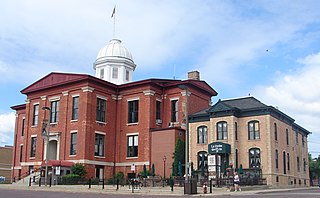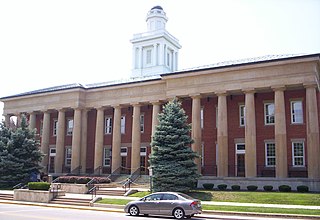
Pomeroy is a village in and the county seat of Meigs County, Ohio, United States, along the Ohio River about 21 miles (34 km) south of Athens. The population was 1,573 at the 2020 census.

The Old McHenry County Courthouse, in McHenry County, Illinois, was listed on the National Register of Historic Places on November 1, 1974. Once the courthouse in the county seat of McHenry County, Woodstock, today the courthouse is occupied by various private tenants including a restaurant and an art gallery. It is one of the key structures in the Woodstock Square Historic District.

Chester is an unincorporated community in central Chester Township, Meigs County, Ohio, United States. It lies along the Shade River at the intersection of State Routes 7 and 248. It has a post office with the ZIP code 45720.

Ashtabula County Courthouse Group is a registered historic district in Jefferson, Ohio, listed in the National Register in 1975.

The Rochester Downtown Historic District is a historic district on the National Register of Historic Places (NRHP) in Rochester, Indiana, United States. It was placed on the Register on June 24, 2008. The majority of buildings in the area are masonry and Italianate while structures outside the district are largely residential frame built structures.

The Cuyahoga County Courthouse stretches along Lakeside Avenue at the north end of the Cleveland Mall in downtown Cleveland, Ohio. The building was listed on the National Register along with the mall district in 1975. Other notable buildings of the Group Plan are the Howard M. Metzenbaum U.S. Courthouse designed by Arnold Brunner, the Cleveland Public Library, the Board of Education Building, Cleveland City Hall, and Public Auditorium.

The Darke County Courthouse, Sheriff's House and Jail are three historic buildings located at 504 South Broadway just south of West 4th Street in Greenville, Ohio. On December 12, 1976, the three buildings of the present courthouse complex were added to the National Register of Historic Places.

The Warsaw Courthouse Square Historic District is a historic district in Warsaw, Indiana that was listed on the National Register of Historic Places in 1982. Its boundaries were increased in 1993.

Valparaiso has retained an active downtown. It remains a mix of government, retail and business center, with a mixed residential and service area. Numerous economic changes have not changed the basic character, historic courthouse area. The historic district retains the distinctive turn-of-the-19th-century architecture, supporting numerous small specialty shops, shaded sidewalks, and a people friendly environment. The Downtown District, is anchored on the Porter County Courthouse. It includes 14-blocks surrounding the square, bounded on the north by Jefferson Street, on the east by Morgan Street, on the south by Monroe Street, and on the west by Napoleon Street.

The Linn County Courthouse is located on May's Island in the middle of the Cedar River in Cedar Rapids, Iowa, United States. It, along with the Veterans Memorial Building and two other buildings, is a contributing property to the May's Island Historic District that was listed on the National Register of Historic Places in 1978. The courthouse is the third building the county has used for court functions and county administration.

The Downtown Morgantown Historic District is a federally designated historic district in Morgantown, Monongalia County, West Virginia. The district, encompassing approximately 75 acres, has 122 contributing buildings and 2 contributing sites including commercial and public buildings, residences, and churches. The district has been listed on the National Register of Historic Places since May 2, 1996. Ten of the contributing buildings are listed separately on the National Register of Historic Places. Significant structures located within the historic district are the Monongalia County Courthouse, the Metropolitan Theater, and the Old Morgantown Post Office.

The Sandusky County Jail and Sheriff's House is a historic government building near downtown Fremont, Ohio, United States. Built in the early 1890s, it was used as an incarceration facility for almost a century before closing and being converted into an office building.

The Holmes County Courthouse is a historic government building in Millersburg, Ohio, United States. Built in the late nineteenth century, it has been designated a historic site because of its architectural importance.

The Sandusky County Courthouse is a local government building in Fremont, Ohio, United States. Built in the 1840s and since greatly modified, it remains in use by the government of Sandusky County.

The Old Meigs County Courthouse is a historic former government building in the small community of Chester, Ohio, United States. Erected in the early nineteenth century, the courthouse served multiple purposes for the surrounding community in its early years, but it operated as a courthouse for less than twenty years before being abandoned in favor of another courthouse in another community. Following a restoration in the 1950s, it was designated a historic site in the 1970s along with an adjacent school; the two buildings are operated together as a museum. It is Ohio's oldest extant building constructed as a courthouse.

The Old Perry County Courthouse is a historic government building in the village of Somerset, Ohio, United States. Built in the 1820s as a courthouse, it is one of Ohio's oldest existing buildings constructed for that purpose, and it has seen the controversy of a county seat war. For much of its history, it has served as Somerset's village hall, and it is located within a federally designated historic district.

The Cheshire County Courthouse, located at 12 Court Street in Keene, New Hampshire, is the center of government of Cheshire County, New Hampshire. Completed in 1859 to a design by Gridley James Fox Bryant, it is believed to be the oldest courthouse in regular use in the state. It was added to the National Register of Historic Places on December 13, 1978.

The Newport Downtown Historic District encompasses the 19th century heart of Newport, New Hampshire, the county seat of Sullivan County. The district includes the major commercial and civic buildings which line Main Street between Depot Street and the Sugar River. The district was listed on the National Register of Historic Places in 1985.

The Joseph P. Kinneary United States Courthouse is a federal courthouse in Columbus, Ohio, in the city's downtown Civic Center. It was formerly known as the U.S. Post Office and Court House. It was designed by Richards, McCarty & Bulford and was completed in 1934. The supervising architect was James A. Wetmore. It was renamed for Joseph P. Kinneary in 1998. It is still in use by the U.S. District Court for the Southern District of Ohio.

The Columbus Civic Center is a civic center, a collection of government buildings, museums, and open park space in Downtown Columbus, Ohio. The site is located along the Scioto Mile recreation area and historically was directly on the banks of the Scioto River.






















